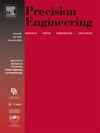Enhancing 3D coordinate measurements in laser scanner by friction compensation
IF 3.7
2区 工程技术
Q2 ENGINEERING, MANUFACTURING
Precision Engineering-Journal of the International Societies for Precision Engineering and Nanotechnology
Pub Date : 2025-08-07
DOI:10.1016/j.precisioneng.2025.07.024
引用次数: 0
Abstract
This study addresses the challenge of precise laser ray spatial positioning in the presence of nonlinear friction dynamics during 3D coordinates measurement. We developed a novel control strategy integrating friction compensation to enhance the reliability and accuracy of 3D laser scanning instrument to enhance measurement quality. Our approach updates the classic LuGre friction model using Scanning Electron Microscope (SEM) analysis of micro-relieved surfaces, aiding in the dynamic characterization of the internal variable ‘z’ for the laser positioner control synthesis. The global asymptotic stability of the system was proven using Lyapunov’s direct method and Barbalat’s lemma. Experimental results validate the improved accuracy in positioning, demonstrating a significant reduction in the uncertainty of measurement spatial coordinates using the friction-compensated laser scanning system. Our study implemented and evaluated three control algorithms, including two advanced compensation controls, highlighting their effectiveness in reducing friction-induced errors and improving laser positioning accuracy. Our contribution advances the instrumentation precision through friction compensation, improving the nonlinear friction dynamics to enhance the stable laser ray positioning and, correspondingly, the accuracy of 3D coordinate measurements.
摩擦补偿增强激光扫描仪三维坐标测量
该研究解决了在三维坐标测量过程中存在非线性摩擦动力学的情况下精确激光空间定位的挑战。为了提高三维激光扫描仪的可靠性和精度,提高测量质量,提出了一种集成摩擦补偿的新型控制策略。我们的方法更新了经典的LuGre摩擦模型,使用扫描电子显微镜(SEM)对微松弛表面进行分析,有助于激光定位器控制合成的内部变量“z”的动态表征。利用Lyapunov的直接方法和Barbalat引理证明了系统的全局渐近稳定性。实验结果验证了定位精度的提高,表明使用摩擦补偿激光扫描系统可以显著降低测量空间坐标的不确定性。我们的研究实现并评估了三种控制算法,包括两种先进的补偿控制,突出了它们在减少摩擦引起的误差和提高激光定位精度方面的有效性。我们的贡献通过摩擦补偿提高了仪器精度,改善了非线性摩擦动力学,从而提高了激光射线定位的稳定性,从而提高了三维坐标测量的精度。
本文章由计算机程序翻译,如有差异,请以英文原文为准。
求助全文
约1分钟内获得全文
求助全文
来源期刊
CiteScore
7.40
自引率
5.60%
发文量
177
审稿时长
46 days
期刊介绍:
Precision Engineering - Journal of the International Societies for Precision Engineering and Nanotechnology is devoted to the multidisciplinary study and practice of high accuracy engineering, metrology, and manufacturing. The journal takes an integrated approach to all subjects related to research, design, manufacture, performance validation, and application of high precision machines, instruments, and components, including fundamental and applied research and development in manufacturing processes, fabrication technology, and advanced measurement science. The scope includes precision-engineered systems and supporting metrology over the full range of length scales, from atom-based nanotechnology and advanced lithographic technology to large-scale systems, including optical and radio telescopes and macrometrology.

 求助内容:
求助内容: 应助结果提醒方式:
应助结果提醒方式:


